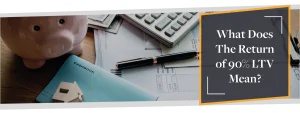
December 15th, 2020
The Return of 90% LTV Mortgages
‘Unprecedented’ is a word that has been used a lot this year and it is certainly fitting; many 90% (LTV) Loan to Value mortgages were withdrawn in June with lenders citing the ‘unprecedented demand’ for their temporary withdrawal.
In a move intended to manage demand and reduce the impact to service, the reduced availability in 90% LTV mortgages has arguably hit first-time buyers the hardest.
The mortgage market here in the UK has, nevertheless, seen a stimulated and active year for homebuyers with low interest rates, rising house prices and the stamp duty holiday all accounting for the considerable boon to buyers this year.
Now, as 90% LTV mortgages start to become available again, CMME explains what this means for your mortgage plans.

What Does The 90% LTV Return Mean?
Over the last few months, the industry debate surrounding the limited availability of low deposit mortgage deals has centred on first-time buyers.
Lenders largely pointed to staffing shortages as reason for implementing the restrictions however it was first-time buyers that largely felt the impact of this reduction, many being unable to progress their mortgage plans so far this year.
With the return of these products this month, this means that this group, amongst others, can resume their mortgage plans making the mortgage market much more accessible once more.
How Does This Affect My Mortgage Plans?
Home buyers should expect to see 90% LTV products more readily available in the coming months but be prepared that these products may be in high demand.
Many experts are anticipating delays in the coming months thanks to pent up demand and the impending Stamp Duty holiday deadline.

90% LTV vs 70% LTV:
If you look at the average house price in London for example, which Zoopla estimates as £666,264 you can see very clearly why the increased availability is important.
70% LTV mortgage on a property valued at £666,264 requires a 30% deposit which totals a whopping £199,879.20 – the cost of a modestly sized 2-bedroom house on the south coast.
Antithetically, a 90% LTV mortgage on the same property takes the deposit due down to £66,626.40 freeing up a staggering £133,252.80 for the buyer to do whatever they like with!
First Time Buyers
For first time buyers, the difference in 10% and 30% deposits can naturally, for many buyers, completely affect their ability to move forward with their mortgage plans.
With the reintroduction of these products, the market becomes much more accessible once more to first-time buyers, increasing the location and property size viable for many of these buyers.
Home Movers
For home movers, there are similar benefits in terms of accessibility, however, the added bonus of 90% products mean that home movers can anticipate being able to sell their properties more easily and are likely to be able to look at larger properties or more expensive areas with the added flexibility of a 10% deposit.
Here’s what Simon Butler, the head of mortgages for CMME had to say on the product return:
“While the stamp duty holiday has helped many buyers to purchase this year, the increase on required deposit levels to 15% or more has shut out many would-be first-time buyers and movers from pressing ahead.
The reintroduction will help to open the door again, with the added benefit of being able to save if the purchase completes before March 31st 2021.”
Tips For Getting Mortgage Ready?
What’s In The Video?
1.Look at the market
Know what house prices are doing and investigate all costs associated with the property including council tax, insurance, and utility bills.
2.Prepare for the credit checks
Look at your profile/report to ensure you have a healthy score. Close credit and store cards that you do not use to boost your score, as mortgage lenders treat unused but open credit as potential debt.
Do not undertake credit searches before you look at mortgages. Pay off as much debt as possible.
Use a service like Credit Karma to keep an eye on your credit health.
3.Get your paperwork ready
You will typically need three months’ personal and business bank statements, in-date passport and/or a driving licence, proof of your earnings (contracts or trading accounts if you don’t work via contracts) and proof of deposit.
Check out what our experts about deposits and documents: here’s what they had to say.
4.Get your deposit ready
Either save or get a gift from direct family. Generally speaking, the bigger the deposit, the lower the interest rate.
Here are the top seven savings tips for self-employed professionals from CMME: find out how to get better at saving here.
5.Approach a specialist mortgage broker
Working for yourself takes an independent spirit. CMME understand that and share it.
CMME are proudly independent, meaning we’re free to find the right lending partner for you, to negotiate hard on your behalf and cut a deal that works.
Useful Resources:
- What Does The Spending Review Mean For Contractors? | CMME Explains
- Check out CMME’s Free Contractor Mortgage Guide
- What Does The Spending Review Mean For Contractors? | CMME Explains
Whether you want to talk specifics or are just after some general advice, CMME can help. Speak to us today on 01489 223 750 for a completely free, no-obligation mortgage consultation. Or click the button below.



